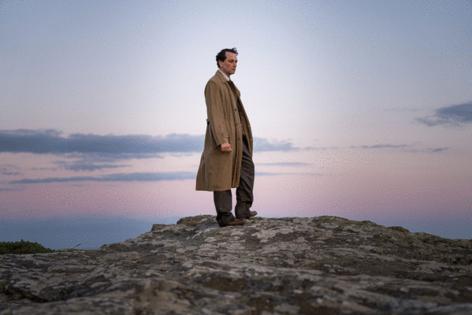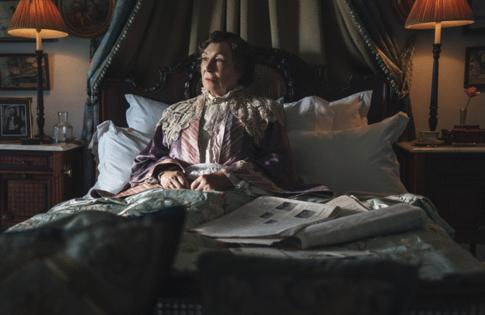Review: 2 new mysteries show the tariff-proof resilience of Arthur Conan Doyle and Agatha Christie
Published in Entertainment News
Though a war was once fought to defend the American colonies from the whims of a mad king — it worked out well, for a time — we have spent the centuries since importing British culture: its pop music, fish and chips, miniskirts, Mohawks and, most of all, its mystery stories.
A cultured breed distinct from the hard-boiled native brand, its king and queen are Arthur Conan Doyle and Agatha Christie, as it is almost impossible not to know. Conan Doyle: creator of Sherlock Holmes and by extension all subsequent super sleuths with an eccentric character, eagle eye for detail, encyclopedic knowledge of unexpectedly useful trivia and the brain of a UNIVAC. Christie: architect of the country house mystery and the scene in which all the suspects are gathered in a room as the detective — her best-known are the fussy Belgian expat Hercule Poirot and the deceptively small-town Miss Marple — helpfully explains who did it and how it was done. Between them, the authors account for 95% of the clever twists and methods of murder you will encounter in any mystery ever.
For a long time, imported British mystery TV series were more or less the province (and a good portion of the bread and butter) of public television. Now there are whole streaming channels dedicated to them, amid many other platforms and networks hungry for content. Wednesday brings two new series, the Christie adaptation "Towards Zero" on BritBox, and an original Holmes adventure, "Sherlock & Daughter," on the CW.
Holmes has long been the subject of pastiches and parodies and post-Conan Doyle excursions on the page and on the screen — hundreds of them, I'd wager, not that I'm going to count. Writers including Stephen King, Philip José Farmer, Michael Chabon and Anthony Burgess have had their way with him. Played by Basil Rathbone, he fought Nazis in Wold War II; he collaborated with Sigmund Freud in Nicholas Meyer's "The Seven-Per-Cent Solution"; and in the person of Benedict Cumberbatch, hurried through the glass-tower forest of 21st-century London.
Created by Brendan Foley with James Duff ("The Closer") as showrunner, "Sherlock & Daughter" fits the CW's history with female-forward genre shows. Holmes this trip is David Thewlis (Mike Leigh's "Life Is Sweet" and "Naked," Remus Lupin in the "Harry Potter" films and a corrupt policeman in "Enola Homes 2"), but he shares title billing with Blu Hunt as Amelia Rojas, a young woman who has come over from California after the murder of her mother. A genius engineer, set designer and inventor living out in the back of beyond, Mom had left Amelia a message that Holmes is her real father, and with Amelia's demonstrated gift for observation and deductive reasoning, and because the show is called "Sherlock & Daughter," we are invited to believe the same.
Things at 221B Baker Street are not what they used to be. Where is Dr. Watson? Where is Mrs. Hudson? And what's happened to Clara (Gia Hunter), the American ambassador's daughter, who became friends with Amelia on the boat to England, only to disappear from her bed? Who's this snooty Lady Violet (Fiona Glascott) who was hovering around her? Why does Clara's father (Phillip P. Keene) seem like such a pill? Why do American actors sound so stilted when playing characters from the 19th century when British actors sound so natural? What's the deal with the red thread? The finger in the box? Does it have anything to do with Prof. Moriarty (Dougray Scott)? And why does Holmes seem reluctant to investigate?
Amelia enters the Holmes manse through the servants' entrance — this might be a novel addition to 221B — and, owing to the recent dismemberment of Holmes' scullery maid, is mistakenly hustled into the vacant job. Owing to her Western spunk, talent for deduction, ability to identify a tobacco scent Holmes cannot and the detective's need for a sidekick, she's made his assistant. (Though she still has to cook his eggs.) He doesn't buy the paternity story, though, as things go on, he will become, in his Holmesian way, paternal: "It's odd how concern for your safety affects my concentration." She goes against his precepts and disobeys his orders — they appear as onscreen italic titles — and he gets stroppy, as a father would. ("If you do not open this door at once, I will knock it down.") But she gets results.
Thewlis, who has the ranginess and sharp profile one associates with the character, is a fine Holmes, caustic with a comic edge, and Hunt holds her own as his problematic partner. I can't say the plot makes perfect sense — as only half of the eight-episode season was available for review, I have no idea where it's going — but you can say that about many if not most mysteries, and it's enjoyable from moment to moment.
Because Marple and Poirot are trademarked by a watchful Christie estate, there have been no new stories added to the originals; they are just adapted, again and again, sometimes faithfully, often very loosely. Older adaptations are on the whole cozy, while more recent versions tend to be darker, downplaying the romance and comedy. Directed by Sam Yates — co-creator and director of "Vanya," Andrew Scott's one-man "Uncle Vanya," currently a hot theater ticket in NYC — "Towards Zero," based on a 1944 novel, falls securely in the loose camp. It offers neither Poirot nor Marple, though a Marple-ized version, starring Geraldine McEwen, was filmed in 2007. The detective here, blending a couple of characters from the book, is Inspector Leach, a depressed drinker so unkempt one wonders why he hasn't been put on administrative leave. He's played by Matthew Rhys, the series' big name alongside Anjelica Huston.
The story's Handsome Man is tennis star Neville Strange (Oliver Jackson-Cohen), newly married to Kay (Mimi Keene), who, instead of a promised honeymoon in the Greek sun is being dragged to the seaside Devon estate — dreary, even when the sun is out — of Lady Tressilian, whose late husband was Neville's guardian. Also invited, for insensible reasons, is Neville's first wife, Audrey (Ella Lily Hyland), blond to Kay's brunette, for easy identification. Joining them dismally around the dinner table and in the drawing room are family lawyer Mr. Treves (Clarke Peters); his teenage ward, Sylvia (Grace Doherty), a kleptomaniac orphan; Tom (Jack Farthing), a mopey wild card back from Malaysia at the prompting of his lovestruck pen pal, Mary (Anjana Vasan), Lady Tressilian's paid companion; Neville's intimidating valet (Adam Hugill); and an obviously untrustworthy Frenchman (Khalil Ben Gharbia) Kay picks up in the nearby hotel, where the houseguests go for a change of scenery, sexy dancing and inebriated mind games. Readers of the book will not recognize all these diversions, but the story's outlines are more or less observed.
It chugs along on the usual questions. Who can we trust? Who'll be dead? Whodunit? How'd they do it? (The "why" is never that interesting.) Adapter Rachel Bennette leaves room for you to remain unsure — you will certainly be playing "Towards Zero: The Home Game," if you are any sort of mystery fan. Naturally, you're being manipulated the whole time to keep you watching, as tiresome as the characters can become over the series' several hours.
The main attractions other than that it's a new Christie adaptation — a considerable audience is going to show up just for that — are Huston, who brings a quietly irritable majesty to her part and is just plain good to see again, and Rhys, screwing himself into the dictionary definition of hangdog. Apart from the solution — that there'll be one is a given — there's an extra happy ending, an extra-happy extra happy ending, you will have been prepared to hope for. And will get.
———
'SHERLOCK & DAUGHTER'
Rating: TV-PG
How to watch: 9 p.m. ET Wednesdays on The CW (streaming the next day)
———
'TOWARDS ZERO'
Rating: TV-MA
How to watch: BritBox
———
©2025 Los Angeles Times. Visit latimes.com. Distributed by Tribune Content Agency, LLC.
















Comments